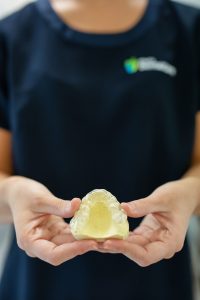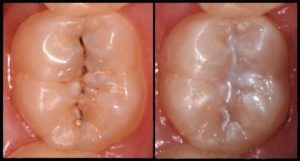What Is an Occlusal Splint?
An occlusal splint is a slim, hard acrylic guard fitted to the upper jaw. This covers the biting surfaces of your upper teeth. It is designed to be worn at night. Although an occlusal splint will not stop you from grinding or clenc
hing, it will guide the jaw intoa neutral position which relieves some of the pressure on the
Wearing this device will save your teeth from severe wear, chips and fractures. It will also help to alleviate pain in your jaw.
Why Do I need A Dental Splint?
An occlusal dental splint is generally recommended to patients who present to us with obvious signs of Bruxism. Bruxism is when a person grinds their teeth while not chewing. The teeth grind or rub together as the jaw moves forcefully either from side to side or back and forth. Often, the person is not aware that they are doing it.
Teeth clenching is when a person holds their teeth together and clenches the muscles, but without moving the teeth back and forth.
People can grind or clench their teeth during the day and the night, and sleep-related bruxism poses a bigger challenge because it is harder to control.
Bruxism is one of the most common sleep disorders. It is an unconscious neuromuscular activity.
What Affect Does This Have On My Teeth?
Clenching and grinding can damage our teeth. It wears them down and over time makes them shorter, blunt or fractured. Clenching teeth puts added pressure on the jaw muscles, tissues and structures surrounding the jaw. This results in jaw pain and stiffness, sore gums, sensitive, loose or broken teeth, clicking or popping of jaw joints and dull headaches. At times stress, anxiety and insomnia can make your clenching and grinding worse.

Is further Treatment Necessary?
Your splint is there to absorb the force of your clenching and grinding. Therefor it provides something to wear down other than your teeth! You may find after years of wearing your splint that it may wear down, chip or even break. This should only happen after years of wear. If this happens, a new splint will need to be made for you.
In some cases, patients may be referred to see a physiotherapist to help with jaw discomfort. They are often given exercises to help strengthen the jaw muscles.



















